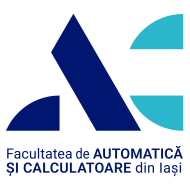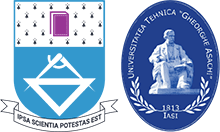The Master’s degree program in Embedded Computers offers graduates of bachelor’s degree studies, with a foundational background in computer system architecture and programming, in-depth knowledge related to the development of hardware and software applications based on embedded computers. The program addresses the concept of the Internet of Things and provides advanced knowledge in the design of complex automation systems, self-testing and operational safety, reliability and fault tolerance, as well as knowledge regarding the security of computing systems, communication in embedded computer networks, or in sensor networks. Additionally, the program addresses advanced techniques in graphic processing and signal processing.
Extracts from the discipline sheets for the subjects studied in the field of Computer Science and Information Technology.
Studied discipline
Year I
| Semester I | Semester II |
|---|
| Embedded computers | Internet of Things |
| Digital signal processing techniques | Artificial vision |
| Cybersecurity | Reliability and operational safety |
| Research and Practice (sem. 1) | Self-testable digital circuits |
| Advanced machine learning techniques | Research and Practice (sem. 2) |
| GPU Programming | Ethics and integrity |
| Real-time operating systems |
Year II (from 2020)
| Semester I | Semester II |
|---|
| Embedded computer networks | Multidisciplinary project |
| Designing human-computer interaction systems | Development of Master’s Thesis |
| Research and Practice (sem. 3) | Research and Practice (sem. 4) |
| Dedicated computing systems | |
| The security of mobile devices | |
| Design and verification of SoC (System on Chip) | |
Teaching series
Acquired skills (listed in the supplement)
Professional skills
- The knowledge of advanced concepts in the field of computer science and information technology, as well as the ability to operate with these concepts.
- The application of advanced methods for analyzing hardware systems and the associated software and communication components.
- Design, implementation, and testing of high functional safety systems based on embedded computers.
- The development of complex applications for embedded computer systems using project management principles, programming environments, and advanced technologies.
Transversal skills
- The application, in the context of complying with legislation, of intellectual property rights, principles, norms, and values of the professional code of ethics within one’s own strategy of rigorous, efficient, and responsible work.
- Assuming leadership roles/functions within a multidisciplinary team, and applying techniques for effective communication and teamwork.
- Creating opportunities for continuous training and effectively utilizing resources and learning techniques for personal development.
Possible occupations (COR code – Classification of Occupations in Romania)
- Research Engineer in Computers (215236)
- Computer Researcher (215235)
- Research Assistant in Computers (215237)
- Systems and Computer Design Engineer (215214)
- Computer Network Administrator (System Engineer) (252301)
- Database Administrator (252101)
- Software Systems Engineer (251205)
- IT Project Manager (251206)


